Eight Christians pay tribute to the thinkers who have most influenced them

Oswald Chambers
I was 18 years old and serving children and teens in New Jersey when someone gave me Oswald Chambers’ autobiography Abandoned to God (Barbour & Co Inc). Tens of thousands of people use his daily readings, My Utmost for His Highest (Discovery House) but, for me, the starting place was his story. It has inspired me to serve – to be, as he often put it, “broken bread and poured out wine” for God. Nothing withheld, unoffendable; identifying with the death and resurrection of Christ.
More than 100 years ago, Chambers recognised the biblical and spiritual illiteracy in the Church, noting the “unwillingness or lack of training in how to engage the mind in earnest study for God, with eyes wide open to the real world and the hurting people in it”. As a principal of a Bible college, Chambers speaks my language. Don’t waste your time studying for the sake of it. Train to know him better, “be transformed by the renewing of your mind” (Romans 12:2), and make a difference with the time you have.
The actual readings in My Utmost were collated by Chambers’ wife from the talks he gave to troops during the first world war. I don’t always understand everything I read but there are times when it is exactly the right thing at the right time, and I appreciate the deep insights that only come through time spent absorbing and reflecting on the Bible. Don’t miss that point: we often dumb down biblical teaching to the lowest common denominator, but Chambers spoke not to academics but to soldiers, many of whom did not return from the battlefield. His teaching was accessible, practical and impactful yet so deep theologically.
My encouragement is to give the daily devotionals a go. Pick up a copy or read it online (utmost.org) and begin a journey with him.
Andy du Feu is Principal and CEO of Moorlands College.

Dr Amy Orr-Ewing
I wish I had discovered Dr Amy Orr-Ewing before my minor crisis of faith at 18. While studying theology at the University of Oxford, I encountered numerous atheist professors who (metaphorically) ripped apart the Bible, dismissed the historical Jesus and publicly ridiculed my entire belief system. Thankfully, there were also many intelligent Christian academics around me to set the record straight, such as Alister McGrath, Graham Tomlin and the late Michael Green.
I know Amy’s experience and expertise would have helped me immensely. When I interviewed her recently for the ‘Unapologetic’ podcast, she described being grilled by 14 Oxford dons about her theology undergraduate exam papers (the day before her wedding), because of her belief that Jesus actually said the words described in the Gospels. Nonetheless, she graduated with a first-class honours degree and has spent the last 25 years helping many people discover the evidence for Christianity.
Apologetics is such an important part of theology, helping Christians to articulate the reason for their hope (1 Peter 3:15) as well as helping non-Christians think about life’s big questions and showing them that the answers are found in Jesus.
Amy has a real gift for articulating complicated theology in a simple, engaging and understandable way. Through her books and talks, she speaks powerfully to both people’s heads and hearts. Anyone who has spent longer than a minute reading or listening to her will recognise how well she loves and knows the Bible, as well as being Spirit-filled, prophetic and pastoral.
In an often-male dominated environment, where occasionally someone appears keener to win an argument than a person, I am incredibly grateful for Amy Orr-Ewing. She is undoubtedly one of the world’s best apologists, yet whenever her wisdom is delivered, she epitomises the call in 1 Peter 3:15 to communicate with “gentleness and respect”.
Ruth Jackson is the host of ‘The CS Lewis Podcast’, ‘Unapologetic’ and part of the presenting team for Premier Unbelievable.
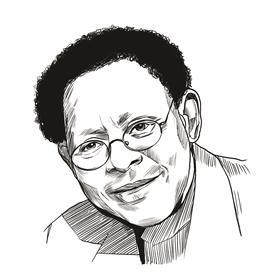
James H Cone
As a psychotherapist, issues relating to difference, equality, diversity and power are all grist to the mill. In the same way, James H Cone attempted, through his writing, to find Jesus beyond the prevailing hurdles of colour and power.
From a psychotherapeutic perspective, it is the norm for both the practitioner and patient to embark upon a journey of discovery (often fraught with emotion). In this partnership, one is in search of authenticity, while the other is the confidential companion. Cone’s work presents his philosophical and spiritual dilemma from the outset, with the reader taking on the role of his confidential companion. His aim was to establish a platform from which he could express Christianity and Black power. For him, growing up in the early to mid-20th century, Christianity belonged to white people and had little, if anything, positive to offer those of differing hues. A theme of his work was resolving this presenting dilemma.
In his book, Black Theology and Black Power (Orbis), we see the clash of ideologies clearly expressed in the personalities and opposing voices of Rev Dr Martin Luther King Jr and Malcolm X. Herein lies the authenticity of Cone, in that he chose to address the dilemmas head-on. He courageously pursued wisdom, understanding, knowledge and the truth of God.
Cone used words such as hatred, supremacy, racism, power, subhuman, Black and white; not pejoratively but in ways that sought to provoke honest reflection. He simply wanted people to have a grown-up conversation about being Christian and being Black.
He regularly highlighted the plight and struggle of the oppressed, often in stark contrast to the complacency and apathy of the oppressor. Cone’s candour, clarity and courage are some of the reasons why his work remains both revolutionary and influential.
Ike Odina is a psychotherapist and programme leader on the BA theology and counselling programme at London School of Theology

Julian of Norwich
Julian of Norwich was an anchoress; a hermit who lived in a cell abutting – ‘anchored’ to – a church in Norwich in the late 14th and early 15th centuries. She wrote Revelations of Divine Love (Penguin Classics), the first book to have been published by a woman in English, while she was in there. The text describes 16 visions which she experienced at the age of 30 during a fever that brought her close to death.
Julian of Norwich was a bright star in my dry-as-dust theology degree at the University of Oxford; the one writer who didn’t try to organise God. She has inspired me ever since. She was the subject of my doctoral thesis, which explored her contribution to the ecological crisis. The porous way she received her visions and the power of the text she wrote describing them is an invitation to her readers to come into a direct encounter with God themselves.
All shall be well, and all manner of things shall be well
In 2019, not long after I finished my doctorate, I was diagnosed with myeloma, a cancer of the blood. Julian moved from being the subject of my academic study to my spiritual companion and guide through two and a half years of gruelling treatment. She taught me to be porous to my illness, to open my heart, over and over again, to the hard things I had to face. She taught me to front and forgive the pain. Because of her, my cancer became a source of joy not bitterness.
Although she wrote 650 years ago, Julian speaks to our times. Like us, she lived in a century of pandemic, war and social unrest. She teaches us that God’s love is unceasing and unconquerable, and because of that: “all shall be well, and all shall be well, and all manner of things shall be well”.
Dr Claire Gilbert is the founding director of the Westminster Abbey Institute and author of I, Julian (Hodder & Stoughton), a fictional autobiography of Julian of Norwich
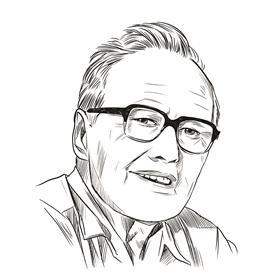
Lesslie Newbigin
I met Lesslie Newbigin when he was in his 80s, and it transformed both my theology and my life. The first book of his I read was The Gospel in a Pluralist Society (SPCK) and, as soon as I finished it, I started it again. I discovered in Newbigin a deep respect for scripture, which he brought into dialogue with the best philosophical and sociological understanding of our culture. I had soon read everything else he had written.
Newbigin and his wife spent more than 30 years as cross-cultural missionaries in India. He then spent the last decades of his life writing arguably his most important works. He desperately wanted the Church to rise to the challenge that had hit him on his ‘retirement’ bus journey from Madras to Birmingham – the West was as much in need of the gospel as the rest of the world.
He explained this revelation in a seminal article in the Princeton Seminary Review: “While in great areas of Asia and Africa the Church is growing, often growing rapidly, in the lands which were once called Christendom it is in decline. Surely there can be no more crucial question for the world mission of the Church…Can there be an effective missionary encounter with this culture?”
Newbigin’s answer is a resounding “Yes”. In his book Sin and Salvation (Wipf and Stock), he explains how the grand sweep of the Bible points to the gospel’s message as a four-dimensional reconciliation with God, neighbours, the environment and ourselves.
His theology has led me to try to help the Church go where transformation is needed most, for example by supporting vulnerable children, migrants and asylum seekers. There, I have witnessed the salience of Newbigin’s theology – as the Church welcomes those on the margins, the proclamation of the good news is shown to be authentic and dynamic.
Dr Krish Kandiah OBE is the founding director of the Sanctuary Foundation
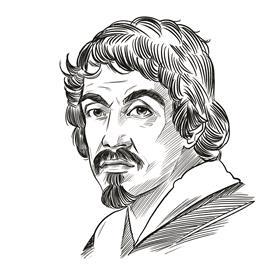
Caravaggio
Michelangelo Merisi da Caravaggio (1571-1610) is known for creating some of the most profound works of Christian art while, at the same time, pioneering a new way of seeing the world.
His work would shift the visual trajectory of Western art but Caravaggio was known as much for his carnality as his creativity. He was eventually exiled from Rome as a murderer and died at 38 trying to return. However, it seems that, from this complexity, he was able to visualise truths that we often miss.
Through his work, I’ve learned how to hold paradox, a reality central to Christianity. In The Calling of St Matthew (sited in San Luigi dei Francesi, Rome), I am held in the dramatic moment between Jesus’ command and Matthew’s obedience, reminding me that while God calls us, we are graced with agency. Christ, held in a shaft of natural light cast by a window, steps into a place of perceived corruption, calling Matthew out of his darkness into the true light. At the same time, the holy and profane collide as Jesus stands in the space without shoes, the floor dirtying his feet, reminding the viewer that where his presence is, we are on holy ground. Finally, there is ambiguity of Matthew’s character: is it the older man pointing to himself, recognising the Lord’s call, or the younger man counting his coins, having not yet noticed who is in the room? This pushes me to ask who I am in the painting, recognising that the Matthew I identify with could change from moment to moment.
Through his work, Caravaggio pushes us to see differently, while cultivating an imagination capable of holding the paradoxes found in the Christian life. He challenges us to look in the unexpected places and learn from unexpected people about the truth of who Jesus is.
Dr Sara Schumacher is a tutor and senior lecturer in theology and the arts at St Mellitus College
John Stott
The late John Stott has had a hugely significant influence on my life and ministry. Every time I read anything of his or heard him speak, it impacted me profoundly. His book, I Believe in Preaching (Hodder & Stoughton) inspired me to begin to work at communication and open up the word to others. The Cross of Christ (IVP) played a massive part in me becoming an evangelist. Issues Facing Christians Today (Zondervan) provided answers and theological reflections on so many hot topics that others didn’t go near. His writing and editing of much of The Bible Speaks Today commentaries have helped me hugely in my preaching. His thoughts on creation care were well ahead of their time.
The real joy for me was that the man himself was even more inspiring than his writings and teaching. I was privileged to meet him on a number of occasions and I will always be grateful for his wisdom in this context too. What went on to impress me further was that, when he was asked towards the end of his life what he would do differently, given his time again, he said that he would pray more. This is so challenging as he got up at 6am every day of his adult life and, in his later years, changed this to 5am. He began each day this way, keeping records of people and issues to pray for and continued in prayer for the rest of the day. Prayer was the key to everything for him.
I thank the Lord for John Stott. I encourage you to pick up any of his books. They will help you follow his example of keeping Jesus as the key focus in all things at all times.
Gavin Calver is CEO of the Evangelical Alliance
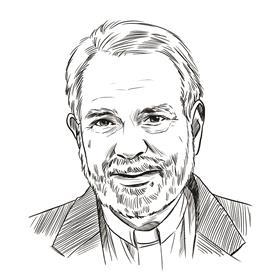
James B Jordan
No one has shaped the way I think or influenced my vocation as profoundly as James B Jordan. Chiefly a Bible teacher rather than an academic theologian, the brilliance of his work has sadly been broadly neglected in the academy. However, it has been seminal for so many and, downstream of such people, his influence has proven much broader than the recognition of it.
Jordan’s most famous work,Through New Eyes: Developing a biblical view of the world (Wipf and Stock) trains readers to perceive the typology and symbolism that pervade the biblical text. Besides this and a handful of other books, most of Jordan’s work can be found in his Biblical Horizons newsletters, audio talks and lectures. I am pretty sure I have read or listened to all of them, most more than once!
If we cannot recognise the truth, then it cannot liberate us from untruth
In contrast to many biblical scholars whose work may focus upon a small subset of canonical literature, Jordan has always been a whole Bible person: his work ranges across the entirety of the canon, and constantly exposes the intertextuality between and within the testaments, revealing the unity and inspiration of the scriptures.
His desire is to see biblical truth metabolised by the Church and, as such truth has a transformative effect, to flow out into practical culture and society. The recovery and development of the Church’s liturgy, the singing of psalms and the formation of a rich and culturally transformative Christian imaginary, have also been integral to his work.
So much of my own research and work – perhaps especially my free chapter-by-chapter audio commentary on the whole Bible – is downstream of Jordan’s work and vision: of expansive and deep, yet widely accessible, biblical teaching, equipping the whole Church to read all of God’s word.
Dr Alastair Roberts is teaching fellow at the Davenant Institute and author of Echoes of Exodus and Heirs Together (Crossway)
Illustrations: Raden Norfiqri












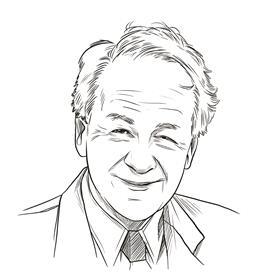





















No comments yet